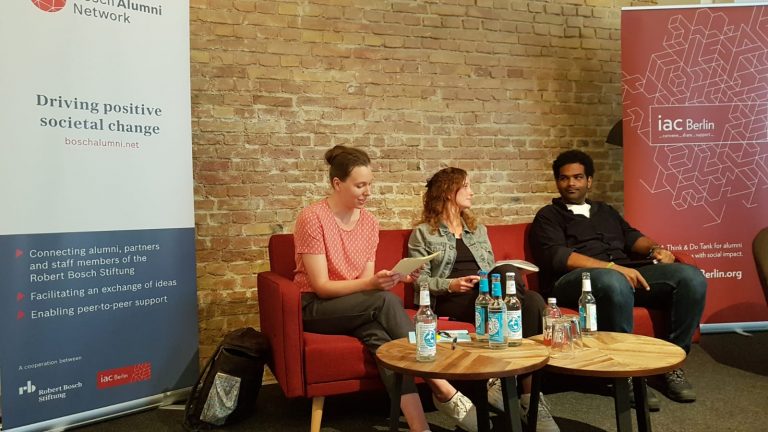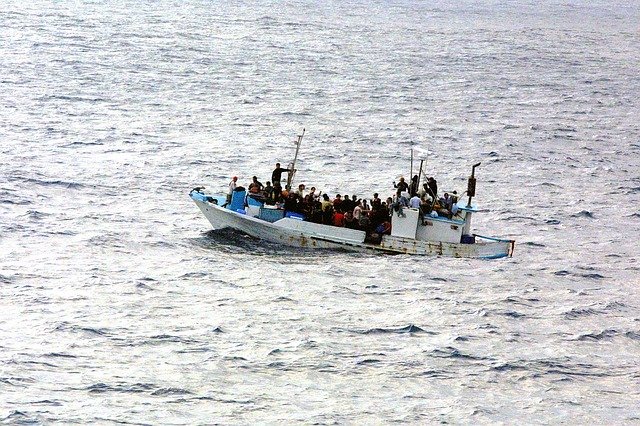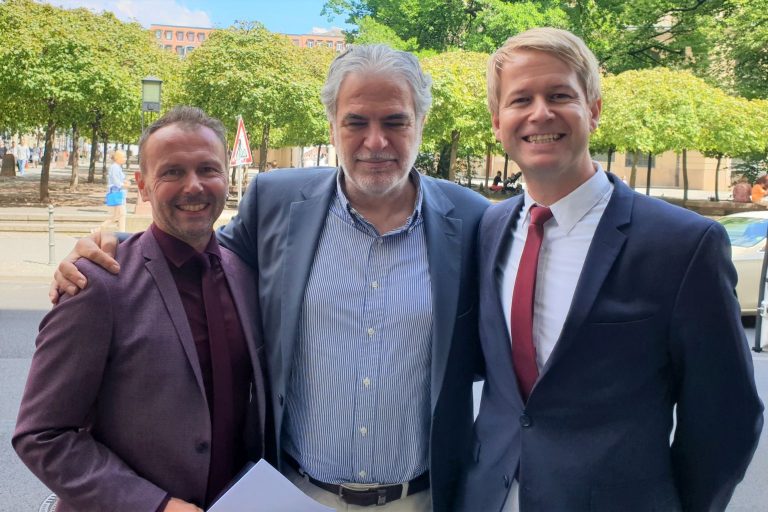On 22 July 2019 the Bosch Alumni Network and the Centre for Humanitarian Action (CHA) organized a “Monday on the Couch” event, which focused on the increasing criminalisation of sea rescue and the implications of migration criminalisation for humanitarian access and civic engagement in Europe. The evening was convened in the community space of the International Alumni Center (iac Berlin).
In addition to the discussants Sarah Hammerl from United Against Inhumanity (UAI) and Muhammad al-Kashef from WatchTheMed-Alarm Phone, many other experienced activists and representatives of aid organisations were present in the audience.
To open up the debate, moderator Sonja Hövelmann from the CHA asked Kashef to provide his personal assessment and contextualisation of the current debate on sea rescue. Kashef noted that one must not only speak of a criminalisation of sea rescue, but of a criminalisation of migration itself.
#Migration is not a crisis or a problem, the policies and laws made it a problem. If we want to stop the smuggling, we have to find a legal passage for the people fleeing. – Muhammed al-Kashef from @alarm_phone #mondayonthecouch @iac_berlin pic.twitter.com/w4obmNmSZp
— Centre for Humanitarian Action (@cha_germany) July 22, 2019
Criminalisation of Migration
Sarah Hammerl also spoke about the general criminalisation of migration and argued that we are witnessing wide-spread debate on the hierarchy of norms in relation to asylum. This manifests itself in the conflict between the upholding of fundamental human rights and refugee protection on the one hand, and the emphasis on the state security and national sovereignty on the other hand. According to Hammerl, negative attitudes within societies towards migrants and refugees can be best explained when viewed as the outcome of these negotiations.
“#Criminalization of #humanitarian action is not a merely legal process, it’s a social process.” – Sarah Hammerl, United Against Inhumanity (UAI) #mondayonthecouch @iac_berlin
— Centre for Humanitarian Action (@cha_germany) July 22, 2019
Activists and humanitarian actors, in turn, are in constant struggle to uphold neutrality. As noted by Hammerl, “humanitarian actors have to stress their political neutrality on the ground, yet the humanitarian imperative – to save lives and ameliorate human suffering – is quite political in itself”.
Contradiction in EU migration policy
Diverse expertise in the audience was reflected in a lively discussion with many questions and comments. The following comment on the EU migration policy points at the fundamental contradiction within the EU response:
“Talking about the #humanitarian narrative will hurt us in the long run, as we are still focussing on a couple of boats with a budget of some million euro compared to billions spent on #externalization and #deterrence.” -Thank you to a brilliant audience last night at @iac_berlin pic.twitter.com/137Vrdbvsr
— Centre for Humanitarian Action (@cha_germany) July 23, 2019
This contradiction has also been highlighted by Criminal Law professor Alessandro Spena, in his article for Oxford University’s Border Criminologies-Blog, which Sarah Hammerl summarises in her recently published report for UAI: “[…]there is an inherent contradiction between the EU’s deterrence policies and its professed commitment to human dignity and human rights, freedom, democracy, equality and the rule of law”.[1]
Although the EU is committed to the protection of migrants and their fundamental rights, as, for instance, in Directive 2008/115/EC, the only state-led sea rescue operation, Mare Nostrum, was ended in October 2014. Instead, the EU re-oriented on fighting human smuggling and illegal migration in its successive naval operations Triton and Sophia.[2]
This issue is being described in detail in the newly published study by EuroMed Rights on “EU-Egypt migration cooperation: at the expense of human rights,” which maps EU and Member State cooperation with Egypt as a study case on migration and border management.
Comparison of EU expenditure
In order to illustrate this contradiction, we researched for this article in the follow-up of the event. As the research by Davies and Neslen (2014) shows, Mare Nostrum cost 9 million euros for one month, which was borne exclusively by Italy, the subsequent operation Triton cost only 2.9 million euros per month.[3]
Compared with the total EU expenditure of 13 billion euros on securing its external borders in 2014-2020, it is obvious that there is an enormous imbalance. According to the EU, expenditure in its next multiannual financial framework 2021-2027 is expected to almost triple to 34.9 billion euros.[4]
The event took place as part of the CHA research project “Shrinking Humanitarian Space”.[1] Sarah Hammerl (2019): Asylum Criminalization in Europe and its humanitarian implications, United Against Inhumanity (UAI), p. 8
[2] Ibid, p. 14
[3] Lizzy Davies/ Arthur Neslen (2014): Italy: end of ongoing sea rescue mission ‘puts thousands at risk’, The Guardian, 31.10.2014
[4] European Commission (2018): Press Release “EU budget: Commission proposes major funding increase for stronger borders and migration”, Brussels, 12.06.2018





